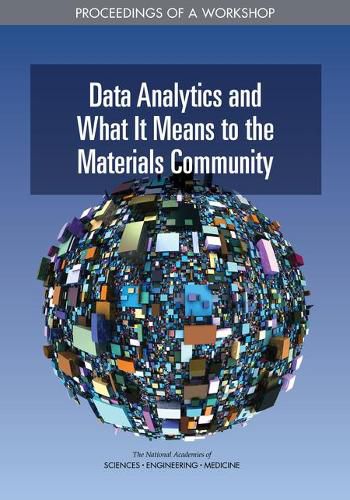Readings Newsletter
Become a Readings Member to make your shopping experience even easier.
Sign in or sign up for free!
You’re not far away from qualifying for FREE standard shipping within Australia
You’ve qualified for FREE standard shipping within Australia
The cart is loading…






Emerging techniques in data analytics, including machine learning and artificial intelligence, offer exciting opportunities for advancing scientific discovery and innovation in materials science. Vast repositories of experimental data and sophisticated simulations are being utilized to predict material properties, design and test new compositions, and accelerate nearly every facet of traditional materials science. How can the materials science community take advantage of these opportunities while avoiding potential pitfalls? What roadblocks may impede progress in the coming years, and how might they be addressed?
To explore these issues, the Workshop on Data Analytics and What It Means to the Materials Community was organized as part of a workshop series on Defense Materials, Manufacturing, and Its Infrastructure. Hosted by the National Academies of Sciences, Engineering, and Medicine, the 2-day workshop was organized around three main topics: materials design, data curation, and emerging applications. Speakers identified promising data analytics tools and their achievements to date, as well as key challenges related to dealing with sparse data and filling data gaps; decisions around data storage, retention, and sharing; and the need to access, combine, and use data from disparate sources. Participants discussed the complementary roles of simulation and experimentation and explored the many opportunities for data informatics to increase the efficiency of materials discovery, design, and testing by reducing the amount of experimentation required. With an eye toward the ultimate goal of enabling applications, attendees considered how to ensure that the benefits of data analytics tools carry through the entire materials development process, from exploration to validation, manufacturing, and use. This publication summarizes the presentations and discussion of the workshop.
$9.00 standard shipping within Australia
FREE standard shipping within Australia for orders over $100.00
Express & International shipping calculated at checkout
Stock availability can be subject to change without notice. We recommend calling the shop or contacting our online team to check availability of low stock items. Please see our Shopping Online page for more details.
Emerging techniques in data analytics, including machine learning and artificial intelligence, offer exciting opportunities for advancing scientific discovery and innovation in materials science. Vast repositories of experimental data and sophisticated simulations are being utilized to predict material properties, design and test new compositions, and accelerate nearly every facet of traditional materials science. How can the materials science community take advantage of these opportunities while avoiding potential pitfalls? What roadblocks may impede progress in the coming years, and how might they be addressed?
To explore these issues, the Workshop on Data Analytics and What It Means to the Materials Community was organized as part of a workshop series on Defense Materials, Manufacturing, and Its Infrastructure. Hosted by the National Academies of Sciences, Engineering, and Medicine, the 2-day workshop was organized around three main topics: materials design, data curation, and emerging applications. Speakers identified promising data analytics tools and their achievements to date, as well as key challenges related to dealing with sparse data and filling data gaps; decisions around data storage, retention, and sharing; and the need to access, combine, and use data from disparate sources. Participants discussed the complementary roles of simulation and experimentation and explored the many opportunities for data informatics to increase the efficiency of materials discovery, design, and testing by reducing the amount of experimentation required. With an eye toward the ultimate goal of enabling applications, attendees considered how to ensure that the benefits of data analytics tools carry through the entire materials development process, from exploration to validation, manufacturing, and use. This publication summarizes the presentations and discussion of the workshop.